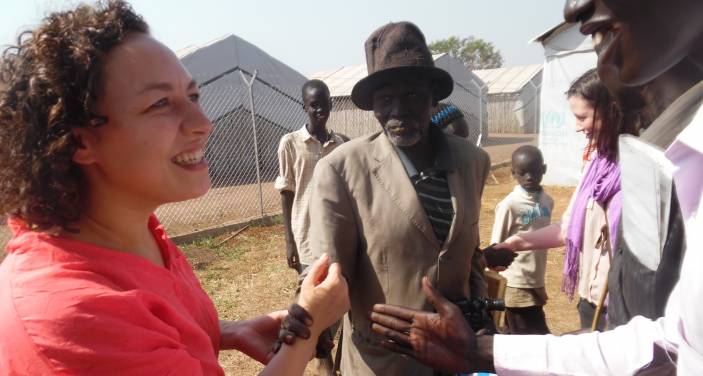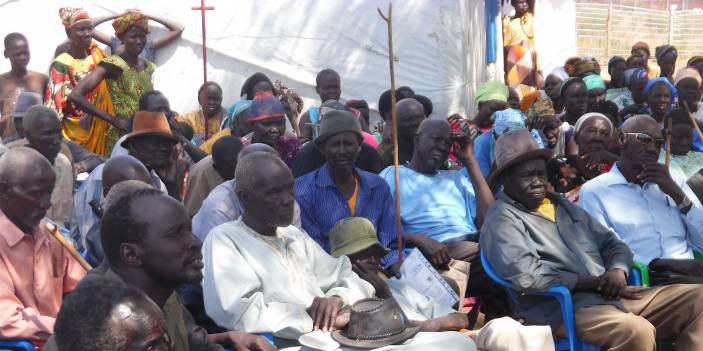
The dust gets everywhere. Even with all of the car windows closed for the entire ten-hour journey, we are all covered in fine, red dust as we clamber out of the vehicle into the sweltering heat of the refugee settlement. Having never been to a refugee camp, I’m unsure of what to expect and tried hard to suppress the rising anxiety in the pit of my stomach. I was picturing the death and starvation I’d seen in camps around the world on TV, but the reality of this settlement doesn’t seem the same.
When I arrived at the Numanzi camp, we walked over to at least 200 older people, many accompanied by the children they care for, under a huge tree at the centre of the settlement. They were expecting us, and burst into a joyous traditional song and danced as we approach. It’s beautiful and moving to everyone sharing the music in defiance of the horrific things they all must have bared witness to in the long lives of the older men and women, and the short lives of their younger counterparts.
Adjumani in Uganda borders South Sudan to the north and is the main entry point for South Sudanese refugees, the numbers of which have increased rapidly due to new threats of horrific violence and terror. Uganda is unique in east Africa for its favourable laws for refugees and because of this over 199,000 people have arrived in Adjumani since the domestic and political situations worsened in South Sudan in 2013.
Refugee camps are much more commonly referred to as ‘settlements’ here, as the rules restricting movement typically found in areas such as this are more relaxed than in other parts of the world.
The story of David and the work of HelpAge
Our translator, who expertly translates between Dinka, Luganda and English, enables us to hear directly from the older people. David is 70. He and his wife care for their three young grandchildren. His daughter and her husband were killed by violence in their village before the family fled to Adjumani. He speaks passionately about how the most important thing is that his grandchildren are able to go to school and get a good education.
David is a key member of one of the older people’s groups set up by HelpAge in the settlement. He went on to talk about how much he valued the work of the HelpAge staff in Adjumani, something we heard from every older person who spoke to us.
But we have so much more to do. Many older people are predominantly concerned about their children and grandchildren, and many of them are the main carers for grandchildren whose parents have either died or have had to return to South Sudan.

Collecting data on how many older people in refugee camps are carers continues to prove difficult, but working with other organisations will allow us to refine this and eventually show the true picture.
This is just one of the many challenges older people here face. But with the help of dedicated volunteers and monitoring group members, as well as the involvement and determination of the older people themselves, older men and women are being better considered in these refugee settings.
